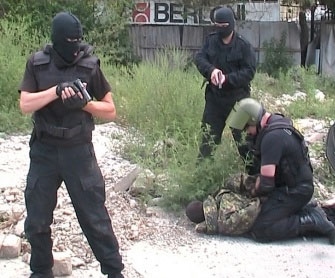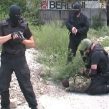
Are There in Fact ‘15,000 Radical Islamists’ in Crimea?
Publication: Eurasia Daily Monitor Volume: 10 Issue: 131
By:

A retired Ukrainian intelligence officer who attracted attention a month ago by calling for the formation of a Russian-Ukrainian corps to fight for the Syrian government now claims that there are 15,000 radical Islamists in the mountains of Crimea. Many of them, he claims, have fought in Tajikistan, Chechnya, Libya and now Syria, and will now be returning to Crimea and the North Caucasus to disrupt the Sochi Olympics if Syrian President Bashar al-Assad falls.
Kyiv has not responded to Colonel Sergey Razumovsky’s call for the formation of a pro-Assad corps (lenta.ru/news/2013/05/28/syria/), but it appears to be taking his comments about Islamist radicals in Crimea more seriously—although, certainly the Ukrainian government puts no more stock in the number he cites than does anyone else. Were that figure accurate, Crimea would have long ago descended into chaos. But the suggestion that Islamist training camps exist on the peninsula and that some of the people in them have fought in Syria is something no responsible government could ignore out of hand.
In an article in Moscow’s Svobodnaya Pressa portal at the end of last week, Sergey Ilchenko summarizes both what the Ukrainian security agencies are doing and what the actual situation regarding “Islamist terrorists” in Crimea and their relations with the Syria opposition in fact is (svpressa.ru/society/article/70875/).
Although officials have not made any public announcement to this effect, Ilchenko says, Ukrainian special forces under the direction of the Ukrainian Security Service, its interior and defense ministries and its border guards have been searching for radical militant groups in the mountains of Crimea under the guise of a training exercise. The journalist says that an anonymous source in the staff of these exercises told him that Ukrainian commanders had asked a group of linguists to identify the nationality of an individual taped during the execution of a Catholic priest in Syria. The linguists, Ilchenko says, reported that there was “a 95 percent probability” that the individual speaking Russian on the tape and directing the murder was a Ukrainian.
At least one Crimean Tatar has been killed in the Syrian fighting, Ilchenko says, identifying him as Abdulla Dzhepparov from Sary-Su, Crimea. Dzhepparov was a Hizb ut-Tahrir activist whose father is a member of the local mejlis. And “according to the most modest count, at a minimum 400 representatives of Muslim Crimea are now fighting in Syria on the side of the opposition.” Sources Ilchenko does not identify say they received their initial training in camps in the peninsula’s mountains and last month participated in a Simferopol meeting that called for the establishment of a new caliphate base on sharia law.
“If Assad holds out,” Ilchenko says, “the bearded ones will return home,” first “into the mountains of the Tauride” and then into the North Caucasus where they can be expected to launch terrorist attacks against the Sochi Olympiad in 2014.
Ukrainian officials have been slow to recognize this danger, the Svobodnaya Pressa journalist continues, dragging their feet regarding an ongoing court case about Crimean Tatar collaboration with the Germans during World War II and not taking seriously reports about Islamist camps on the peninsula. Ukrainian “siloviki [law enforcement and security services operatives] have openly sought the slightest pretext to refuse to conduct investigations regarding this case,” Ilchenko says. But now they appear to be focusing on the issue of Islamist activities among the Crimean Tatars.
Zair Smedlyaev a member of the Crimean Tatar Milli Mejlis (executive body representing the Crimean Tatars) was recently summoned to the Ukrainian Security Service to explain his declaration that “the flag of his organization is ‘an attribute of statehood.’” Smedlyaev refused to disown remarks in which he said that the Crimean Tatar flag is of course a sign of statehood and that “the Crimean Tatars had their own statehood and, if it is Allah’s will, they will have it again” (svpressa.ru/society/article/70875/).
It is unclear whether the remarks of Colonel Razumovsky and the article by Sergey Ilchenko are provocations, intended to goad the Ukrainians into actions against the Crimean Tatars. The absurdly high figure the retired intelligence officer gives and the linkage suggested between any instances of Crimean Tatar collaboration during World War II and Islamist activism now certainly suggest such a conclusion, all the more so since these notions wrap together standard tropes in Moscow’s commentaries about Syria, Islamist terrorism and threats to the Sochi Olympic games.
But it is also possible that these statements mean both less and more than that. Less in that they are not based on a solid foundation of fact, but more in that they reflect a willingness to assume that any Muslim people, however moderate its history—and the Crimean Tatars represent one of the most moderate Muslim peoples on earth as the influence of Ismail Bey Gaspirali shows—is now suspect. Such a mindset prompts otherwise reasonable governments to act on the most baseless of charges out of fear that radicalism is on the march and that any regime that ignores this purported threat will be forced to act in that way by other states or the passions of its own population.




